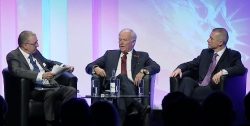I had a rare opportunity to interview 2 of the airline world’s most successful leaders, President of Emirates, Sir Tim Clark and CEO of IAG, Willie Walsh, on stage together at the World Travel Market.
Like chalk and cheese in many respects, Emirates is in its 31st year, whilst IAG is only 5 years old. Emirates is an established brand whilst IAG is better known outside the airline world for its successful constituent airlines, British Airways, Iberia, Aer Lingus and Vueling. As a holding company delivering profits, not achieving notoriety, is its game. In this it has excelled when compared to the lacklustre performance of its peers, Air France KLM and Lufthansa.
Emirates has ploughed its own furrow which has suited Clark, a former network planner, just fine and allowed him to truly craft the airline to his own, highly successful, specification. According to him the airline is an “organic animal” which since the beginning “… needed to have direct control over exactly what we wanted to do, when we wanted to do it and where we wanted to do it” he explains.
IAG on the other hand, is an industry consolidator and has been able to draw upon Walsh’s cool head (he’s a former pilot) and track record in facing up to challenges. Under his leadership the Group is focussed on achieving synergies and efficiencies whilst “keeping the best of the individual brands” he says. Each member airline is accountable for its own profitability.
We got stuck into several weighty issues. The subject of airline alliances seemed a natural discussion point given Emirates’ very deliberate avoidance of membership. Clark wryly notes that they emerged in the early 80’s but the “bedrock of alliance thinking has been challenged in recent years”
Walsh sees them as still having a role for now, but questions “… whether they will continue to have value in the future.” He points to the rise of joint ventures whilst Clark highlights the shift of airline business models, particularly the challenge to orthodoxy posed by the rise of long haul LCC carriers.
Both men see this emerging business model as becoming more importance but very much dependent on a liberal air service environment. Clark is concerned about a move away from liberalism and the emergence of “fortresses” which could cause the model to fail due to simple lack of market access. Walsh notes the challenge Norwegian has faced to achieve full access to the US market (now granted).
As for the financials, it’s not good enough just to be called Long Haul LCC. “The label means nothing. I measure success by profitability.” says Walsh. The key will be whether an airline “exceeds its cost of capital on a sustainable basis”. He admires Bjorn Kjos and Norwegian but says “he is yet to crack the profitability bit”. Clark sees high volume, high density being the key to success (e.g. an 800 seat A380).
Meanwhile Walsh asserts that Aer Lingus “…is the lowest cost producer of Trans Atlantic flying & is very profitable”. Add to that the plans to densify seating on some BA 777’s and fly head to head on Norwegian routes at Gatwick and there are some interesting skirmishes ahead for sure!
We had to have a bit of an aircraft chat. Knowing that Sir Tim Clark is a real believer in the Airbus A380, I wanted to know what the 2 industry giants thought was the aircraft’s future? He has tried in vain to convince Airbus to commit to a new upgraded version of the aircraft and remains convinced that increasing runway capacity pressures at so many hub airports will dictate that airlines think again about ultra large aircraft. He feels that some airline boards have become risk averse.
Walsh could make a case for a couple of A380’s in Iberia, maybe one in Aer Lingus. That type of thinking wouldn’t make sense if the airlines weren’t part of a group he says. He likes the aircraft and “If the price was right we are prepared to look at more A380’s…Airbus offer great aircraft…at terrible, really expensive prices!” he told me, grinning broadly.
Turning to airports, both men are vigorous in their views that they have to become more efficient in their provision of new infrastructure. Walsh has gone into bat on what he regards as excessive costs for the planned new runway at Heathrow. Clark argues that attempting to “extract the cost of expansion out of the existing client basis” is not the right way to do it, stating that “…if airports can’t extract value from the…passengers going through…then you really shouldn’t be in the business in the first place”.
There’s certainly mutual admiration between the two leaders with Clark describing IAG’s achievements as “quite spectacular” whilst Walsh looks “with envy at what Tim has achieved. Despite their success both airlines have faced a challenging year with Emirates profits down over 75% and IAG issuing a profit warning. Challenges may be meat and drink to these two industry leaders, but with 2017 shaping up to be equally tough, they are likely to have a lot on their plates. They’ll need to draw upon every bit of their experience to keep these two very different airline groups on track and in the black.

Leave a Reply